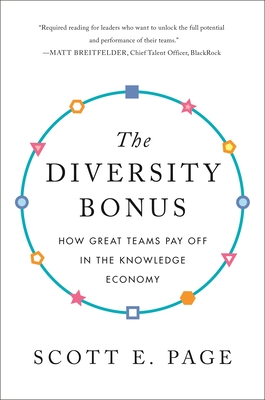

 Princeton University Press
Princeton University Press
The Diversity Bonus: How Great Teams Pay Off in the Knowledge Economy


Key Metrics
- Scott Page
- Princeton University Press
- Paperback
- 9780691191539
- 7.9 X 5.2 X 1 inches
- 0.75 pounds
- Business & Economics > Decision Making & Problem Solving
- English
 Secure Transaction
Secure TransactionBook Description
How businesses and other organizations can improve their performance by tapping the power of differences in how people think
What if workforce diversity is more than simply the right thing to do? What if it can also improve the bottom line? It can. The Diversity Bonus shows how and why. Scott Page, a leading thinker, writer, and speaker whose ideas and advice are sought after by corporations, nonprofits, universities, and governments, makes a clear and compelling practical case for diversity and inclusion. He presents overwhelming evidence that teams that include different kinds of thinkers outperform homogenous groups on complex tasks, producing what he calls diversity bonuses. These bonuses include improved problem solving, increased innovation, and more accurate predictions--all of which lead to better results. Drawing on research in economics, psychology, computer science, and many other fields, The Diversity Bonus also tells the stories of businesses and organizations that have tapped the power of diversity to solve complex problems. The result changes the way we think about diversity at work--and far beyond.
Author Bio
I am the John Seely Brown Distinguished University Professor of Complexity, Social Science, and Management at the University of Michigan, and the Williamson family Professor of Business Administration, professor of management and organizations, Stephen M. Ross School of Business; professor of political science, professor of complex systems, and professor of economics, LSA. In 2011, I was elected to the American Academy of Arts and Sciences.
My research focuses on the myriad roles that diversity plays in complex systems. For example, how does diversity arise? Does diversity make a system more productive? How does diversity impact robustness? Does it make a system prone to large events?
I have written five books: “The Model Thinker – What you need to know to make data work for you” – stresses the application of ensembles of models to make sense of complex phenomena; “The Diversity [Bonus] – How Great Teams Pay Off in the Knowledge Economy” the follow up and expansion on the themes in The Difference; “The Difference”, which demonstrates the benefits and costs of diversity in social contexts, Complex Adaptive Social Systems (with John Miller), which provides an introduction to complexity theory, and, most recently, Diversity and Complexity, which explores the contributions of diversity within complex systems..
I have also published papers in a variety of disciplines including economics, political science, computer science, management, physics, public health, geography, urban planning, engineering, and history.
In my research, I have been fortunate to work with a collection of brilliant people — Lu Hong, John Miller, PJ Lamberson, Russell Golman, Kate Anderson, Ken Kollman, Evan Economo, Michael Wellman, and Jenna Bednar — as I try to make sense of these questions
In addition to writing papers and books, I have also filmed a video course on complexity called Understanding Complexity..
My research on diversity provides me with many opportunities to talk with community groups, high schools, corporations, government agencies, NGOs, and university audiences.
Education
- BA Mathematics University of Michigan,1985.
- MA Mathematics University of Wisconsin, 1988.
- MS Business, J.L. Kellogg Graduate School of Management, Northwestern University, 1990
- PHD Managerial Economics & Decisions Sciences, J.L. Kellogg Graduate School of Management, Northwestern University1993.
- Advisors: Stan Reiter and Roger Myerson
Committee: Mark Satterthwaite, and Matthew Jackson.
Source: University of Michigan
Videos








Community reviews
Write a ReviewNo Community reviews